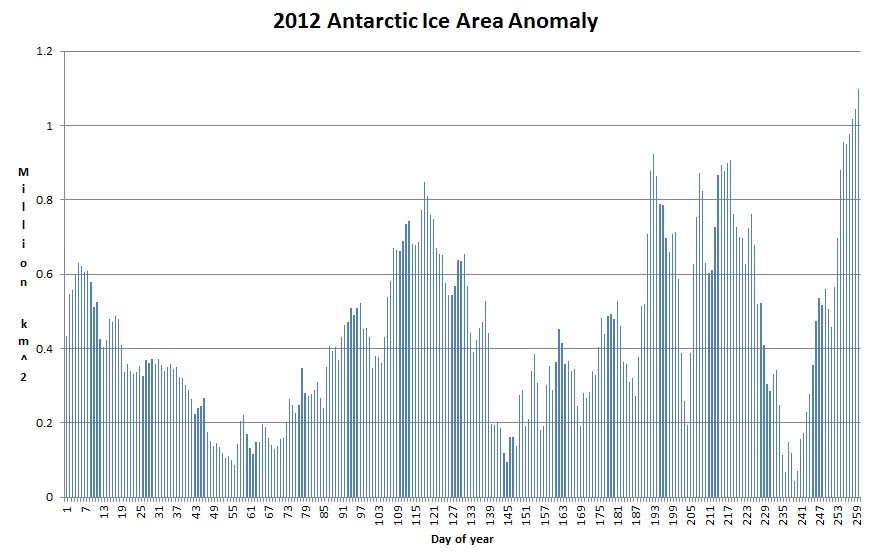Not only is Antarctic sea ice area at a record high, and more than seventeen thousand Manhattans larger than the highest Arctic ice area ever recorded – but it is has been above normal every day during 2012
arctic.atmos.uiuc.edu/cryosphere/timeseries.south.anom.1979-2008



Oh, my, what statistical marvel can I come up with for THAT? Lemme see, above normal for 262 days in a row, what are the odds if there should be an equal chance of being above or below every day? One in 2^262 or one in 7.41e78. Now using Fred Hoyle’s mass of the universe as 8 × 10^52 kg, and taking a few liberties and assuming it is in units of hydrogen equivalents, and using the mass of hydrogen as 1 g/mol, there are 8×10^55g H equiv * 6.02e23 or 4.82e79 hydrogen atom equivalent masses in the universe. And since the odds of antarctic ice being this high by chance is 7.41e78, the odds of this happening by chance is about the same as one seventh of the number of hydrogen atoms in the universe. Which is pretty freakin’ conclusive if you ask me.
Now who on earth is going to argue with odds like that? HUH? What kind of science denier does it take to ignore the EVIDENCE?
Uh, hey pal, is this the line for the grant money?
Seventeen thousand Manhattans?
Pshaw! Merely a flesh wound.
It will be interesting to see if it can keep up the positive anomaly after the maximum as the melt season gets under way and normally the area follows the average.
http://arctic.atmos.uiuc.edu/cryosphere/IMAGES/seaice.recent.antarctic.png
unlike the freeze season where it tends nowadays to be above average.
Andy
Also interesting to see what happens to Arctic sea ice over the next few weeks. Right now it’s going up almost in a straight line. Interesting to see how if that continues.
http://ocean.dmi.dk/arctic/plots/icecover/icecover_current.png
The data is controlled by the team. Look for it to be properly adjusted.
Reblogged this on Sparks.
http://arctic.atmos.uiuc.edu/cryosphere/IMAGES/seaice.area.antarctic.png
look what happened in the freeze season after the Arctic summer minimum in 2007.
I meant melt season after the Arctic summer minimum in 2007.sorry for my mistake.
17,000 Manhattans! Man, that must be one Hell of a hangover for the alarmists.
If the anomaly continues positive for the entire year it will be the first time it happens, since 1979, according to the following graph
http://arctic.atmos.uiuc.edu/cryosphere/IMAGES/seaice.anomaly.antarctic.png
The year when it almost happened was 2009, with two negative minima very close to zero.